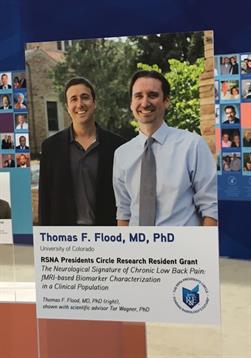Research
The CU Anschutz Medical Campus is a nationally recognized leader in the creation of new knowledge and innovative approaches to improving human health. With sponsored research awards totaling more than $550 million annually, CU Anschutz researchers collaborate with partner and affiliate hospitals, clinics, and centers to bring research from the bench to the patient’s bedside.
Resident academic pursuits are strongly supported by department leadership. There are many opportunities for residents to conduct research throughout the department under the mentorship of faculty advisors. The Department of Radiology has a full-time biostatistician/health services researcher to assist residents and faculty with study design, statistical analysis, communication of research findings, and grant writing. The University of Colorado also participates in the Holman Research Pathway (ABR Holman Pathway) for residents seeking a heavy research emphasis.
Residents, fellows, and attendings showcase their hypothesis-driven research at the Research Symposium, an event sponsored by the department twice a year. Residents give a 6-minute oral presentation on their research, which is judged by a panel of attendings. A $250 academic fund prize is awarded for the best presentation.
Each resident has 5 educational days per academic year to attend a national meeting or review course. Our department funds resident travel to up to 2 national meetings ($1,500 per meeting) each year at which the resident is presenting. Residents travel throughout the country to present their research at national meetings and frequently win awards for their merits. Residents are encouraged to pursue research elective months during residency.
Roentgen Resident/Fellow Research Award
- Evan Norris (2022-2023)
- Zak Ritchey (2021-2022)
- Michael Nguyentat (2020-2021)
- Michael Nguyentat, MD (2019-2020)
- Dorissa Gursahaney, MD (2017-2018)
- Premal S. Trivedi, MD, MSc (2016-2017)
- Michael F. Regner, MD, PhD (2015-2016)
- Premal S. Trivedi, MD, MSc (2014-2015)
- Ronald Schmitt, MD (2013-2014)
- Michael Kendrick, MD (2012-2013)
- Frank Richard Mihlon, IV, MD (2011-2012)
- Jayme Takahashi, MD (2010-2011)
Meet some of our Resident Researchers:
Dr. Premal Trivedi (Class of 2017) currently Assistant Professor of
Interventional Radiology
Dr. Trivedi received a $30,000 grant from the Society of
Interventional Radiology for his proposal, “National comparative trends in
utilization of percutaneous endovascular dialysis access maintenance procedures
by provider specialty, associated complications and long term patency rates
using the Medicare 5% files” and $140,000 grant from the Association of
University Radiologists for “Improving outcomes of transjugular intrahepatic
portosystemic shunt creation in patients with variceal bleeding” (2019). He is
also the Director of IR Research, Director of Health Services Research, and
faculty investigator in the TORR Lab (described below).
Dr. Michael Regner (Class of 2019)
.jpg?sfvrsn=b2e13db9_4)
Dr. Regner participated in our Radiology
Residency/Bioengineering PhD Program and the prestigious ABR Holman Research
Pathway, which simultaneously trains the resident in diagnostic radiology and
in basic science and clinical or translational investigation. The pathway is
designed for the exceptional trainee who has both strong clinical abilities and
a background in research. He also received an NIH F32 grant for $134,000 and a
CCTSI local NIH center grant for an additional $30,000.
Thomas Flood, M.D., Ph.D. (Class of 2018)

Dr. Flood was awarded the 2017 RSNA Presidents Circle Research Resident grant,
which he applied toward learning new research skills and becoming a
physician-scientist under the mentorship of Tor Wager Ph.D., a leading
neuroscientist in the field of functional MRI. As part of the proposal, Dr.
Flood studied the neurological underpinnings of chronic back pain in order to help
elucidate the central nervous system’s role in mediating the experience of
persistent pain. The hope is this will lead to better therapeutic options for
this complex and ubiquitous condition. Dr. Flood on this experience: “This
opportunity, which is invaluable for my development as a medical researcher and
career within radiology, would not be possible without the generous support of
the RSNA and the President Circle donors, our CU Radiology Department, and the
many great mentors that have helped guide and inspire me throughout residency.”
Translational Outcomes Research in Radiology (TORR) Lab
Digitization of clinical and imaging records in parallel with computational advances in the past decades has transformed medicine into an information science. Our lab performs health delivery and outcomes research using big data, with a focus on optimizing access to and outcomes of imaging and image-guided interventions. The TORR Lab is an offspring of the CU Radiology Residency program. With departmental support, Dr. Trivedi started the health services research core as a second year resident and was able to garner national funding for it. Medical students and residents have since chosen work to work with lab investigators in an ad hoc fashion. Permanent fixtures of the lab include three faculty investigators (Dr. Trivedi, Dr. Morgan, Dr. Timpone), a biostatistician (Alexandria Jensen), health services researcher (Margaret Reid), research administrator (Karen Kimes) and two faculty advisors (Dr. Richard Lindrooth, Professor in the Department of Health Systems, Management and Policy in the Colorado School of Public Health and Dr. James Borgstede Vice Chair for Clinical Operations in the Department of Radiology, President of the RSNA Board of Directors and William Thorwarth Awardee for Excellence in Economics and Health Policy from the American College of Radiology). Existing projects include, but are not limited to: health disparities (Trivedi, Morgan), transjugular intrahepatic portosystemic shunt (TIPS) outcomes (Trivedi), imaging work up of transient ischemic attack and associated outcomes (Timpone), value of PET/CT in work up of head/neck and lung cancers (Morgan), and market trends in utilization of peripheral artery disease interventions (Trivedi).

Jody Tanabe, MD
Vice Chair of Research
Section Chief, Neuroradiology
Associate Professor, Departments of Radiology and Psychiatry